One-Party System
Is Nigeria in danger of the possibility?
Since Nigeria’s return to democratic rule in 1999, the political landscape has largely been shaped by a two-party structure. However, recent political trends suggest that the country may be edging dangerously close to a one-party system, an outcome that threatens the essence of Nigeria’s democracy.
The growing dominance of the APC, the fragmentation and internal crisis of opposition parties like the PDP, and the pervasive monetization of politics are converging to create a precarious political environment. If left unchecked, this could erode political competition, deepen ethnic divides, and weaken institutions meant to safeguard democratic governance.
APC’s Quiet March Toward Monopoly
The APC’s meteoric rise since its 2013 formation, through a strategic merger of Nigeria’s largest opposition parties, was initially hailed as a positive development. It disrupted the PDP’s 16-year hegemony and led to Nigeria’s first peaceful transfer of power in 2015.
But what began as a democratic breakthrough now teeters on the edge of a monopoly. In the 2023 general election, APC’s Bola Tinubu clinched the presidency with 8.7 million votes, reinforcing the party’s hold on federal power, a majority of states, and the National Assembly.
This dominance, however, has not been purely organic. A steady stream of defections, often from opposition heavyweights, has swelled the APC’s ranks. The pattern is familiar and troubling: opposition figures cross over to the ruling party, citing vague “ideological alignment,” but often motivated by patronage, protection from prosecution, or access to resources.
When APC National Chairman Abdullahi Ganduje suggested that “a one-party state is not by force, it’s by negotiation,” it underscored a dangerous mindset—one that equates democratic victory with political absorption, not fair competition.
PDP: A House Divided Cannot Stand
Once the colossus of Nigerian politics, the PDP has since stumbled into a pit of its own making. Leadership tussles, ego-driven factions, and weak internal democracy have eroded the party’s credibility. The 2023 elections showcased this dysfunction: the PDP could not rally its full strength behind Atiku Abubakar, who lost to Tinubu amid allegations of electoral malpractice. Meanwhile, the party continues to bleed influence, losing not just elections but the moral authority to be a viable alternative.
The situation has only worsened in 2025. With the National Secretary refusing to step down and senior figures like Sule Lamido accusing the leadership of enabling anti-party activities, the PDP is in free fall.
Instead of functioning as a watchdog for democracy, it has become a cautionary tale of how internal discord can render an opposition party ineffective. As the PDP struggles to unite, Nigeria is left with an opposition that can’t even hold itself accountable, let alone the ruling party.
Politics for Sale: Monetization and the Death of Ideology
At the heart of Nigeria’s political crisis lies a systemic problem: the monetization of politics. Campaigns are obscenely expensive, vote-buying is rampant, and party loyalty is often a currency for transactional gain.
Ideological distinction between parties is virtually nonexistent. Both the APC and PDP endorse neoliberal policies—privatization, deregulation, and similar economic blueprints. This lack of ideological clarity enables defections without consequence. Politicians switch sides not to champion new ideas, but to secure personal interests.
Defections are often accompanied by backroom deals and promises of immunity. In Akwa Ibom, reports emerged of PDP defectors joining the APC to shield looted funds. This is not democracy, it is elite collusion dressed in party colours.
The cost of contesting elections further tilts the playing field in favour of the ruling party, which can deploy state resources to outspend and outmaneuver challengers. When politics becomes a game of who pays most, the poor and idealistic are priced out of participation, and the very concept of opposition dies a slow, painful death.
The Perils of One-Party Rule
A one-party system is not just undemocratic, it is dangerous. It limits citizens’ choices, reduces accountability, and breeds complacency among rulers.
Nigeria, a country of over 200 million people and vast ethnic diversity, cannot afford to be governed by a single party or ideology. A de facto one-party state threatens the delicate North-South power rotation that has maintained relative stability.
If opposition parties are wiped out or weakened to irrelevance, power could become concentrated in the hands of a single ethnic or regional bloc, exacerbating secessionist agitations and ethnic tensions.
Institutional capture is another pressing concern. The APC’s dominance has coincided with allegations of judicial bias, selective anti-corruption prosecutions, and the politicization of security forces.
In 2023, opposition candidates in several states saw their electoral mandates nullified under controversial circumstances, while APC victories were upheld. This erodes public trust in the judiciary and deepens voter apathy.
The PDP itself offers a historical warning. Its dominance in the 2000s bred arrogance and disregard for internal power-sharing agreements, which ultimately led to its collapse in 2015. The APC risks repeating this cycle, only with graver consequences given the weakened state of opposition.
Reclaiming Democracy: The Way Forward
The consolidation of democracy in Nigeria demands more than just regular elections. It requires credible alternatives, robust institutions, and an active citizenry.
Civil society must rise to the occasion, serving as the last line of defense against political monopoly. The media must remain vigilant, exposing anti-democratic tendencies and giving voice to marginalized opinions.
Opposition parties, for their part, must recognize that unity is not optional—it is essential. A fragmented opposition cannot stand against a well-funded and strategically coordinated ruling party.
The Labour Party and NNPP must expand beyond their regional strongholds and develop national appeal if they hope to challenge the status quo. The PDP must reinvent itself or risk complete political extinction.
Furthermore, electoral and party finance reforms are long overdue. Reducing the cost of candidacy, curbing vote-buying, and enforcing transparency in campaign funding can level the playing field. Until then, Nigeria’s democracy will remain a democracy only in name.
Conclusion
Nigeria stands at a critical juncture. The slow drift toward a one-party state is neither accidental nor inevitable, it is the result of deliberate choices, weak opposition, and a political culture corrupted by money and opportunism.
To preserve the democratic gains of the past two decades, all stakeholders—politicians, civil society, and the electorate—must resist the allure of authoritarian convenience and fight for a future where power truly belongs to the people.
Democracy is not about one party winning all the time. It’s about all parties being able to compete on equal terms, and about the people having a real choice. Right now, that choice is slipping away. It’s time to bring it back.







